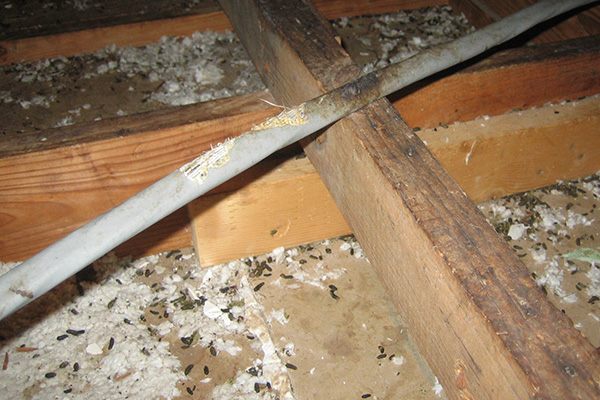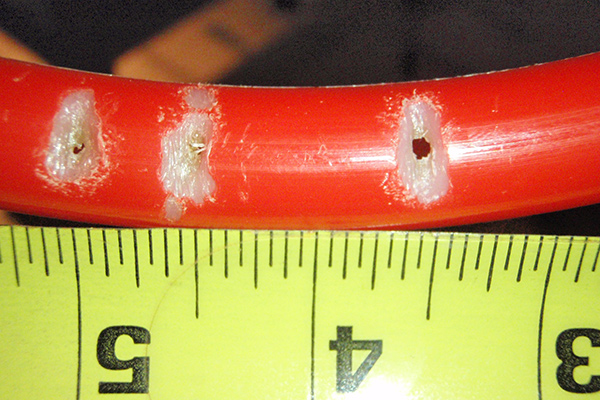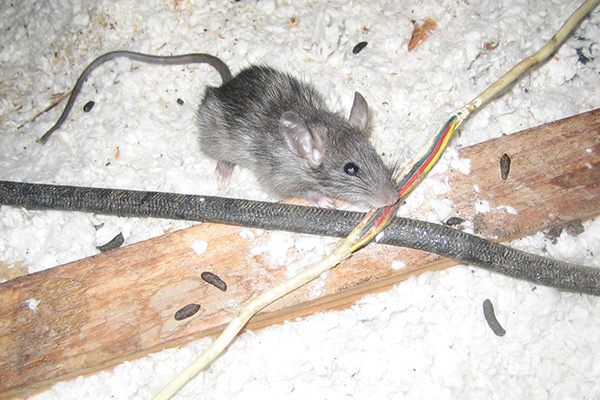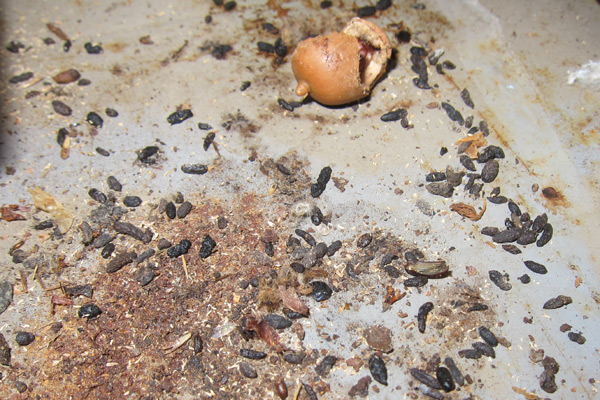- info@animalatticpest.com
- Call - we service 300 locations

Damage Caused By Mice in the Attic
Mice can cause considerable damage in the attic. But not always. It depends on many factors, such as the length of time the mice have been in the attic, the number of mice, the presence of electric wires or water pipes or lack thereof, they type of insulation, and so on. This is why a thorough attic inspection is important. You can get an understanding of what the mice have done, and see specifically what damage they may have caused. Look for areas of trampled down insulation, and paths and tunnels in the insulation. Look for mouse feces and urine stains. You should notice hundreds or thousands of fecal pellets. Often, but not always, mice bring nesting material into the attic. It's usually leaves and other plant matter. This is a good place to find a nest of baby mice. Look for chewed wood, and play close attention to electric wires, to see if they have been chewed and constitute a fire risk. Mice are rodents, and they love to chew, and for some reason are drawn to wires. Read about the fire risk of mice chewing on electrical wires in the attic. Also, sometimes mice in the attic will die, and keep in mind that a dead mouse in the attic is another form of "damage", in that it causes a terrible odor and flies! The feces and urine that the mice leave behind may cause slight odor problems, but more importantly are a potential source of pathogens or illness. Don't touch them! Waste left behind can also encourage the growth of mold, attract bugs like cockroaches, and contains a pheromone scent that will encourage new mice to enter the attic in the future.
Photographs of Mouse Damage in the Attic
Feces and Chewed Wires
Here is a photo of typical mouse damage - you can see brown fur grease, some chewing on wires, and lots and lots of mouse turds scattered everywhere.
Chewed Water Piping
In this attic, mice had chewed holes in a pex water system that went into the walls and attic, causing a large water leak and damage in the house.
Caught in the Act!
If exposed copper rests against any flammable material, such as wood, the heat can ignite the material and cause a house fire.
Mouse Feces and Urine
Here are mouse feces, along with some acorns that they have brought into the attic. Mouse feces can contain some diseases like leptospirosis or hantavirus.
Information About Mouse Damage in the Attic
Damage Caused By Mice In The Attic
Mice can do much more damage to your attic than just causing noise and leaving behind waste. While their waste can pose a significant problem, mice are also likely to chew on any object you have lying around and create numerous issues. This is just one of the many reasons you should take care of your mice problem sooner rather than later, ideally as soon as you notice it.
Causing Noise
One of the more obvious issues mice can cause in your attic is creating noise that disturbs you. You may hear squeaking at varying times of the day and will definitely hear scurrying feet. While this isn’t necessarily damage, it is a disturbance. The good news, however, is that the noise caused by mice typically is what lets homeowners know they have a rodent problem in the first place.
Chewing Stored Items
Mice are notorious for chewing on nearly any object that they can find. This means that if you, like most people, use your attic for storage, they can damage all of your treasured memories and objects you have there. From upholstery in furniture to clothing that is out of season to books and photos, having mice in your attic is a recipe for damaged items with plenty of chew holes. Mice may even chew through the bottom of furniture like dressers to get access to a nice, cozy spot to create a nest.
Chewing Electrical Wires
While chewing your momentos and items being stored in your attic is bad, it is even worse when mice chew the electrical wires in your attic. You may not notice the damage at first and if you catch the mice promptly, they may not do much. If, however, the mice go undetected in the attic for a long time, you are likely to have some serious issues. In the best case scenario, the chewed wire will simply cause a loss of power. It can, however, also lead to a fire hazard, particularly if it is a wire that is used frequently.
Chewing Or Burrowing In Insulation
Mice have been known to chew on insulation and they will also tunnel inside it. Sometimes they use the insulation as a nice, soft material for their nest while other times their tunnels will actually turn the insulation into the actual nest. In either case, once your insulation is damaged, your home can’t regulate its temperature as well. In other words, you have to crank the air conditioning up higher in the summer and the heating up more in the winter, leading to higher electric bills.
Creating Nests
In addition to turning old furniture and insulation into nests, mice can also sometimes cause issues by creating nests in other ways. They may just chew up various materials from around the attic and bring scraps to a nice corner to create a nest. In other cases, they will turn the appliances you have stored in your attics into a nest. Remember that if an item is more hidden, it is also more likely to be chosen as an object for mice to nest in since it offers more protection.
Leaving Waste Products
Even the simple act of leaving behind droppings and urine in your attic can be damaging. These will create a mess and can contaminate any items stored nearby, particularly food. Both urine and feces carry disease, leaving you at risk of contracting a respiratory or other problem. In the case of a large group of mice that remains in your attic for a long time, they may even produce enough urine to cause damage to wooden beams thanks to the moisture; mold can even develop. At the very least, the waste left by mice will cause a very bad smell in your home.
Mice Can Roam
Just because there are mice in your attic doesn’t mean the problem is confined to that space. Mice are small enough to travel through the walls in your home and if they can find a path to your kitchen or another area with food, they will. If a mouse gets into your kitchen, they will eat nearly any food item they find, keeping paper or cardboard wrappings for nesting material. During this process, this will contaminate everything they come in contact with, spreading germs and requiring you to throw out a lot of food items.
What To Do About Mice In The Attic
Since mice can cause so much damage to your attic and the rest of your home, you need to take care of them right away. The best option is to hire a professional as this is the only way to ensure you get all of the mice in the first try. They will likely suggest you seal up all entrances the mice may be using to get into your attic and then use snap traps to kill them all humanely. They will also suggest small changes to make your home less attractive to mice in the future, such as getting rid of potential food sources.




